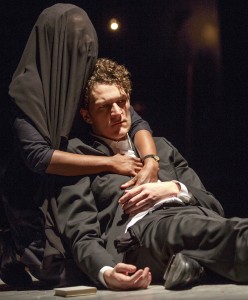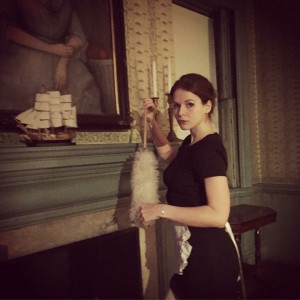Just in time for Halloween, the Off-Off-Broadway troupe Bedlam is spicing up its presentation of Hedda Gabler with a Walpurgisnacht dance. That unexpected choreographic interpolation, with flashing lights, thump-y music, and Hellfire Club costumes, might strike the fancy of Sigmund Freud but would certainly surprise the play’s author, Henrik Ibsen—and perhaps also Jon Robin Baitz, whose adaptation, based on Anne-Charlotte Hanes Harvey’s translation, the production utilizes.
Peer Gynt and the Norwegian Hapa Band
The Ma-Yi Theater Company’s Peer Gynt and the Norwegian Hapa Band offers a sonic interpretation of Henrik Ibsen’s saga Peer Gynt. Ibsen wrote Peer Gynt in 1867 as a dramatic poem, and it was staged a decade later with music by Norwegian composer Edvard Grieg that has become famous. The play touches upon Norwegian mythology and folk tales, and it captures the hard and difficult times of mid-19th-century life in Scandinavia.
Ibsen as Detox
When newspaper editor Hovstad cries, "We must destroy this myth that our leaders are infallible," in the rousing performance of Public Enemy at the Pearl Theatre Company, the audience titters and sighs. That same day, the Washington Post had released a tape of presidential nominee Donald Trump making extremely lewd remarks about women. With Trump's words ringing in the collective consciousness of the audience, playwright David Harrower's adaptation of Henrik Ibsen's 1882 play An Enemy of the People has transposed an almost 150-year-old story about small-town bureaucracy to the higher, tenser key of our present-day political landscape. That is not to say that Public Enemy is toxic, exhausting or anything like the American political process has been this past year. On the contrary, it rejuvenates the public with an eloquent tale of justice and ambition.

Director Hal Brooks, who is artistic director of the Pearl, has confirmed the company's commitment to showcasing incisive, relevant classical theater with Harrower's masterly take on one of the Norwegian playwright's lesser-known plays. Written as a biting response to critics, whose moralistic reviews he despised, Ibsen deliberately set out to magnify the hypocrisy of human nature, and how it is writ especially large in political processes. He chooses to place his little human drama in a fairly provincial town, where the family of Dr. Thomas Stockmann (Jimmon Cole) and his wife (Nilaja Sun) is enjoying a life of newly-found comfort—they're on the upswing after some hard financial times.
Also in the mix are the Stockmanns' friends: fiery newspapermen Hovstad (Robert Tann) and Billing (Alex Purcell), and world-weary sailor Horster (Carol Schultz). Thomas's brother, Peter (Guiesseppe Jones), is the disciplined, severe, and fastidious mayor of the town; in short, he is nothing like his open, intellectual and charismatic brother. When Thomas discovers that the town's famous baths are swimming with lethal bacteria, and that Peter is attempting to cover up the discovery with threats against his security and his family, Thomas is forced to decide between standing by his ideals as a physician, or enveloping himself in willful ignorance.
Cole has an easy, eager charisma about him. It's part of what makes Stockmann's character the Messianic figure in his small town. His truth-seeking is admirable, and recalls Bernie Sanders' inspiring messages, but Stockmann is more interesting than his real-life counterpart. For one thing, he is scaled down to fit the stuffy intimacy of a small town (scenic designer Harry Feiner has built a subdued, wooden interior for the Stockmanns’ home, while costumer Barbara A. Bell elegantly signifies the passage of time with the wear and tear of the characters' clothes). Cole does not scale down his part, however: with his sonorous voice and endearingly bitter humor, he renders Stockmann larger than life.
His brother the mayor, played by Jones, is a blustering, up-for-the-challenge sparring partner. Fastidious and severe, Peter raises the hackles of more than one “reformist,” namely Hovstad and Billing. Their personalities knot up nicely toward the latter half of the play, as does Arielle Goldman's Petra, the Stockmanns' daughter, a teacher. John Keating, who plays a businessman called Aslasken, is a particular revelation in his studied impression of a fickle everyman.
There is an unending tension between the authority and the reformist in Brooks's conception of Ibsen's play. Within this tension, however, is a complexity difficult to explore on stage: the variable nature of truth. Do we seek truth from our authority figures—policemen, politicians, councils of elders—or do we seek it from the reformers—journalists, leaders of movements, and the common man? When the disgraced Roman politician-turned-farmer Cincinnatus was called to serve as Rome's dictator during a period of social strife, he became a paragon of civic virtue when he resigned immediately after peace was restored, and picked up the plow again.
In An Enemy of the People, Ibsen quietly acknowledges that our most beloved leaders are impossible contradictions: they are both the authority and the reformist, both the leader and the common man. Harrower elegantly exposes Ibsen's sadder, but less delusional reality—that while we seek the truth of the reformer (Thomas Stockmann), we give way to fear and accept the truth of the authority (Peter Stockmann). Let's hope our current political theater, with all its muddy truths and maniacal lust for power, takes a note out of Brooks' precise, magnetic production of Ibsen's timely play.
Performances of Public Enemy run through Nov. 6 at the Pearl Theatre (555 West 42nd St.). Tickets are $69-$99 and may be purchased by calling (212) 563-9261 or visiting pearltheatre.org.
An Epic Cut Down to Size
John Doyle has made a name for himself with pared-down productions, mainly of musicals—The Color Purple, now on Broadway; Passion and Allegro for Classic Stage Company—and his first foray into traditional plays for CSC, where he is the new artistic director, features that trademark minimalism. Peer Gynt, written in verse and covering a lifetime of its hero, who wanders from Norway’s fjords to the deserts of Arabia to find himself, is an epic journey.
Ibsen wrote his eventful play in 1867 but did not intend it for performance. After a change of heart, he asked his countryman Edvard Grieg to compose music for a theatrical premiere in 1876. Grieg’s Peer Gynt Suite, which grew out of his incidental music, is one of the most lushly Romantic pieces of music of the 19th century. Here, though, Dan Moses’ Schreier’s music features a couple violins that often drone long notes and underscore scenes, and choral writing that features humming by the six actors playing all the subsidiary parts.
The role of Peer Gynt itself stands as an Everest for an actor, yet it comes around far more rarely than Hamlet. Richard Thomas tackled it brilliantly in Hartford in 1989, under the direction of Mark Lamos. Thomas, plagued by boyish looks long after his years as John-Boy Walton, made the most of them in Peer Gynt and convincingly played the young Peer, while assuming the mantle of the older man easily.
At CSC, Doyle has cast Gabriel Ebert, a Tony winner for Matilda, and he’s the best thing about the production. Ebert conveys the young Peer with high-kicking brio and excess of energy, yet in the quieter scenes his maturity comes to the fore. It’s possible to have two actors play the part, but, reduced to less than two hours from four, this adaptation needs only one. The climax of Peer’s long search for his soul—which society claims he lacks—results in his peeling an onion for meaning, and finding nothing in the center. Ebert claws at it and pulls at it with his fingernails, his eyes reddened by the onion fumes, but with more a determined curiosity than desperation.
Peer is notorious for his tall tales. Returning home from wandering, he tells his mother Åse (Becky Ann Baker) that he has hunted a stag into the wilderness, wounded it, and then, about to kill it, been taken on a wild ride by the injured animal. Åse doesn’t believe him and rebukes him, but then comes around.
Even apart from his imaginary experiences, though, Peer’s life is chock full of incident. Åse tells Peer that his girlfriend is about to be married. Peer crashes the wedding and steals her away. He also meets Solveig (Quincy Tyler Bernstine), a young girl—she’s recently been confirmed, so she must be about 14—who falls for him. Then he flees the fury of the bride’s father; he arrives at the lair of the Troll King (Dylan Baker), seduces his daughter, escapes becoming a denizen of the underground, and begins a lifelong journey to distant lands, ending up finally in Norway again.
Doyle’s adaptation touches on most of the events, but it makes them more real. The cue for this approach seems to come when the Bride says, “That’s the way—we mountain people. Everything has another meaning.” Yet the change pulls Ibsen’s play toward the naturalism that characterized his later work, and and even psychological realism, as Peer's struggles seem to become internalized. At times it underscores Peer’s search for himself with heavy-handedness. “Jack, be thyself,” says the Doctor, who is also the Troll King, clad by Ann Hould-Ward in a gray suit, paper crown and sunglasses. Later in the play, Peer becomes a successful businessman, entering in suit and sunglasses himself, and throws money into the air. It may suggest that in his pursuit of success Peer has become more troll-like, but it's also one of the few grand flourishes in the production. Characters like the Boyg, offering “Go round” as strange advice, don’t appear but are rendered as voices of the Chorus.
Although Doyle’s minimalist, modernist approach may force one to focus on the words, the loss of color and variety risks dulling one's senses and resulting in confusion. To anyone who has experienced a full production, this Peer Gynt seems intent on sensory deprivation.
John Doyle's production of Peer Gynt plays at the Classic Stage Company (136 E. 13th. St., between Third and Fourth Avenues) through June 19. Evening performances are at 7 p.m. Tuesday through Thursday and 8 p.m. Friday and Saturday; matinees are at 3 p.m. Saturday and Sunday. Tickets are available by calling the box office at (212) 352-3101, Ovationtix at (866) 811-4111 or visiting classicstage.org.
Immersed in Ibsen
“Be careful whom you trust,” a maid whispers warningly into my ear as she swishes past me up a dark stairwell. This servant (played convincingly by Macy Idzakovich) is one of many peripheral characters haunting the halls of the historic Morris-Jumel Mansion in Journey Lab and Deaths Head Theatrical's The Alving Estate—an immersive staging of Henrik Ibsen’s Ghosts. Indeed, ghosts are central to Ibsen’s body of work and this particular production, which explore the foibles of the living, as well as the hauntings of the familial past. Though The Alving Estate experience is not without its aesthetic shortcomings, it succeeds in convincing audiences that there are deep secrets hidden within the walls of this eerie mansion.
As my experience with Idzakovich as the maid demonstrates, the participatory nature of Journey Lab's aesthetic infuses Ibsen’s oeuvre with extra sex and intrigue. Journey Lab’s take on Ghosts, like many immersive works today, puts the audience at the center of the experience, giving participants the opportunity to choose where to go (and who to follow) within the mansion. This production choice comes at the expense of narrative cohesion, so if you’re looking for something more experiential than narrative, this is your type of production; on the other hand, if you’re interested in piecing together a storyline, you should read or familiarize yourself with Ibsen’s play before indulging in The Alving Estate.
Upon arriving to the mansion, you are given a job description and prepped for an interview for employment at the estate. After socializing over drinks with other “applicants” in the charming and dimly lit carriage house, audience members are selected at random to begin exploring the mansion. The Morris-Jumel Mansion is itself a star character in this production; its creaks, draughts, and creepy oil portraits all add unique charm and mystique to the experience. Unfortunately, there are some informational plaques visible in parts of the mansion, which distract from the time and place of the immersive experience.
While the site of this performance provides a delightful opportunity to explore an old gem of upper Manhattan, there are other aspects of this production that are less unique. Journey Lab takes a great deal of cues from British immersive theater pioneers Punchdrunk and their long running production Sleep No More, which has been running in Chelsea since 2011. The resemblances between this production and the Punchdrunk aesthetic may distract audience members familiar with the Sleep No More empire. Eerie music, intense moments of eye contact with the actors, and choreography reminiscent of contact improvisation are all pulled directly from the existing repertoire. Even some of the costumes and props—backless ball gowns, old photographs, costume jewelry—seem to be hand-me-downs from The Alving Estate’s immersive predecessor.
Though The Alving Estate is haunted by an existing aesthetic, it still manages to showcase the raw talent and latent creativity of Journey Lab, an immersive company to look out for in the future. Surely, Punchdrunk provides a worthy aesthetic role model for aspiring immersive theater makers, but I suspect that the talent at Journey Lab could—and should—move beyond this copycat approach to become innovators in this exciting contemporary form.
The Alving Estate runs Thursday through Saturday at 7 p.m. until Feb. 6 at the Morris-Jumel Mansion (65 Jumel Terrace) in Washington Heights. Tickets range from $20-$50 and can be purchased by calling or visiting http://journeylab.org/experiences/.












